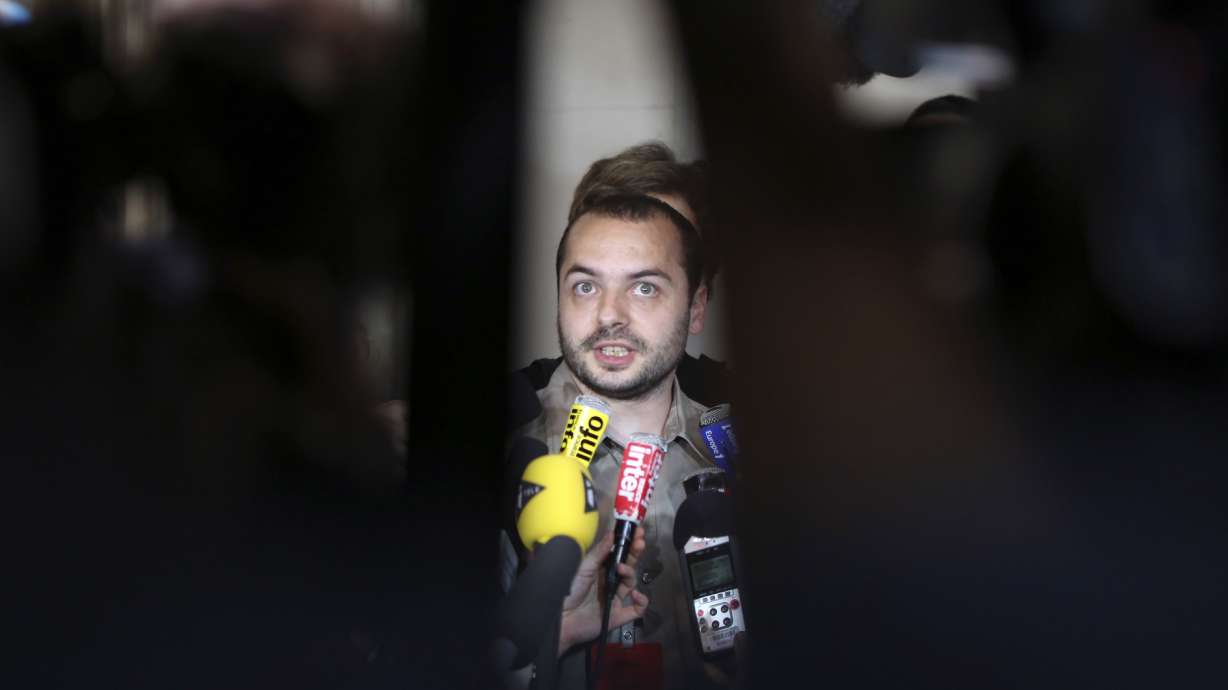Estimated read time: 4-5 minutes
This archived news story is available only for your personal, non-commercial use. Information in the story may be outdated or superseded by additional information. Reading or replaying the story in its archived form does not constitute a republication of the story.
PARIS (AP) — One French court acquitted a doctor of poisoning seven terminally ill patients while another ordered physicians to suspend treatment for a comatose man, while Britain's top court said the country's ban on assisted suicide may be incompatible with human rights. The decisions of the past few days are fueling the arguments of Europeans who say the duty of doctors is to end the suffering of those beyond treatment.
But emotions run high on all sides around the issue of euthanasia and assisted suicide, as is shown by the bitter case of the comatose Frenchman, Vincent Lambert. Hours after the French court sided with his wife in ordering an end to treatment, the European Court of Human Rights blocked the move at the request of his parents, in a rare late-night ruling.
The prosecution in France of Dr. Nicolas Bonnemaison was relatively unusual as well. The physician never denied giving seven terminally ill patients lethal injections, and some of their families testified on his behalf.
Bonnemaison's lawyer said he hoped Wednesday's acquittal — and Tuesday's ruling in the case of Lambert — would force the government to update the law quickly.
"There are no heroes here, no martyrs," said Benoit Ducos-Ader. "This man acted as a doctor. He always acknowledged that, shouted that, despite the blows he received."
Euthanasia is currently legal in the Netherlands, Belgium and Luxembourg for patients whose suffering is "unbearable." France's president has said he wants to make it easier for some terminally ill patients to request medical help to end their lives in the majority-Catholic country.
Assisted suicide is illegal in Britain, although rarely prosecuted. Wednesday's ruling from the British Supreme Court was unexpectedly far-reaching. Although it dismissed the appeal from two severely disabled men who argued the law should be changed to allow doctors to legally kill them, a majority of judges suggested that Parliament change the law to be in line with human rights guarantees.
"It's the strongest thing they could do" short of overturning the law, said Penney Lewis, a law professor at King's College in London.
One of the men who brought the case, Paul Lamb, is paralyzed following a car accident. The other, Tony Nicklinson, suffered from "locked-in syndrome" following a stroke. He died of pneumonia in 2012, but the case has been taken over by his widow.
A measure up for debate this summer in Britain's House of Lords would ease the ability of patients to choose their manner of death.
In the case decided Wednesday, the patients had argued in favor of a device invented in Australia. Doctors would hook up a terminally ill patient to the device and the patients themselves would choose when and how to deliver a lethal drug.
Lewis said the British case and the acquittal of Bonnemaison followed a trend of broadening legal acceptance for euthanasia and assisted suicide.
"I think public opinion has been there a lot longer than the legal opinion," she said.
But the case of Lambert showed a continued ambivalence toward the issue. Lambert's family is divided on whether to withhold food and hydration.
The French court on Tuesday ruled doctors could do so under French law, saying he had made his wishes clear before his car accident six years ago.
That decision was overruled later by the European court, which ordered France to continue treatment until it can examine the case under a measure normally reserved for emergency extradition hearings. The court has jurisdiction across Europe and member countries are bound by its rulings.
"He is not sick, he is not at the end of his life, he is not suffering," Jean Paillot, a lawyer for Lambert's parents, told BFM television on Wednesday. "From our perspective, there is no reason to stop feeding or hydrating him."
The Lambert case has echoes of the legal fight over Terri Schiavo, a Florida woman who suffered brain damage in 1990 when her heart stopped. She died in 2005 after her husband won a protracted court case with Schiavo's parents to have her feeding tube removed.
Jean Leonetti, the French politician whose name is on the 2005 legislation on the right to die in France, said the two cases were a clear demonstration of the need to improve the law, but he suggested that the European court had no cause to intervene.
"If the court decides to rule on the individual case of Vincent Lambert, it will have a lot of work to do for all European countries," he told France 3 television.
Any decision from Strasbourg is months away. In the meantime, Leonetti is among lawmakers given the task of reworking the law.
"We know we have to make the legislative framework evolve on end-of-life questions," said government spokesman Stephane Le Foll. "We have to have a consensus."
___
Associated Press writers Angela Charlton in Paris and Maria Cheng in London contributed.
___
Follow Lori Hinnant at: https://twitter.com/lhinnant
Copyright © The Associated Press. All rights reserved. This material may not be published, broadcast, rewritten or redistributed.








